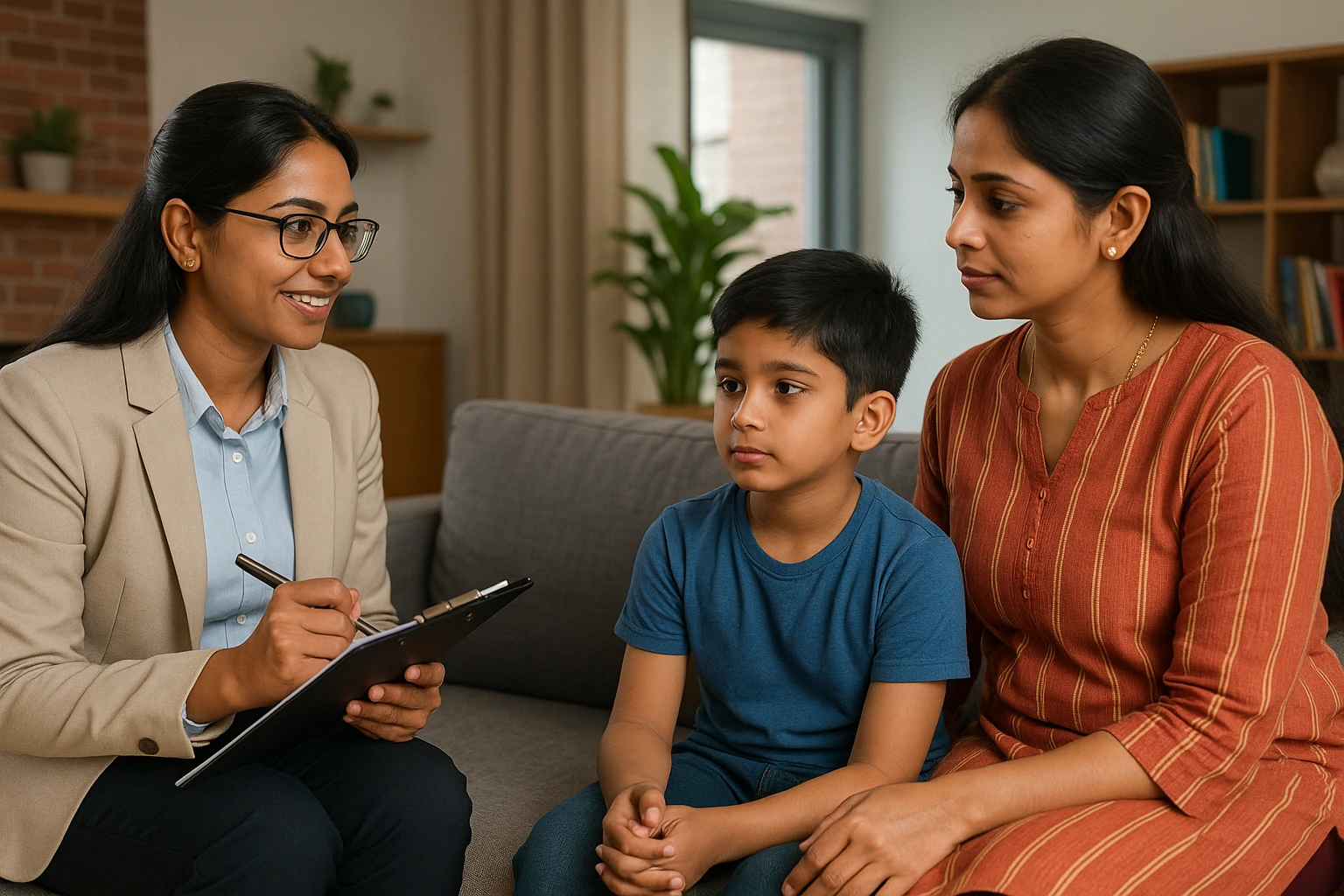ADHD How to Diagnose in Children: Guidelines for Parents

Source: istockphoto
ADHD How to Diagnose in Children: Guidelines for Parents
It is difficult to correctly interpret your child’s behaviors when they seem to feel restless, their attention is easily diverted, or they appear to experience difficulties following specific directions. These actions have the capacity of being indicative of something other than typical childhood energy. “ADHD How to Diagnose” becomes a key concern for many parents in such situations. Early identification helps children get the right support they need both at home and in school. This guide on “ADHD How to Diagnose” offers practical insights to help parents recognize symptoms and seek timely help.
Table of Content
Symptoms of ADHD
ADHD (Attention-Deficit/Hyperactivity Disorder) affects with a child’s capability to focus, suppresses self-control, and results in trouble with regulating energy levels. Accurate early identification can have a profound effect on how a child can learn and interact socially. Before 12yrs of age ADHD signs are observed and continue to appear in adolescence and adulthood stage.
Signs observed in children with ADHD:
Inattention
- Has trouble staying focused on tasks or play
- Makes careless mistakes in schoolwork
- Seems not to listen when spoken to
- Has difficulty organizing tasks or following through
- Frequently loses items like books or pencils
Hyperactivity
- Fidgets, taps hands or feet, or squirms in their seat
- Difficulty staying in one place for long period
- Talks excessively
- Seems always on the go
Impulsivity
- Blurts out answers before questions are finished
- Has trouble waiting for their turn
- Interrupts others during conversations or games
Kids might engage in certain behaviors a few times. But when these patterns happen most of the time – and disrupt kids activity in school, home, and social situations – these behaviours might indicate ADHD and parents can access the right support and resources to assist the child.
For details of the SEN Course, Call or WhatsApp on +919321024137 / +919869546913.
Click here to download the brochure for the SEN Course!

Source: bmergoterapi
Are there Other Tests for ADHD?
ADHD cannot be diagnosed based on a single test, but professionals will use a variety of tools and assessments to better get to know best their behavior. Tests will not diagnose ADHD, but tests will provide very useful information to help make a diagnosis.
Here are some methods commonly used:
Behaviour Rating Scales
The rating scales check the milestone of the child, information about attention span, impulsiveness stages etc from teachers, caretakers and Parents. Some of the rating scales used are Vanderbilt Assessment, the Conner’s Rating Scale etc
Interviews
To get more details related to the background information psychologist or paediatrician may conduct structured interview.
Observation
To understand the pattern of hyperactivity and attention span professionals would observe the kid across different environment eg at home , school etc. to rule out any other cause for such pattern.
Cognitive Tests
Assessment tools are a way to identify memory, attention, or thinking skills, and a way to determine if other unique learning or development factors affect success.
Medical Exams
A physical examination, hearing test, or vision test may be ascertained to determine if symptoms are caused by other physical conditions.
Together, these measures help doctors and psychologists develop a clear constellation of the child’s functioning across settings. When a potential Diagnosis of ADHD is reached, these effective assessments help lead to the appropriate management strategies to improve a child’s daily life.
For details of the SEN Course, Call or WhatsApp on +919321024137 / +919869546913.
Click here to download the brochure for the SEN Course!

Imade by using AI
How can Parents Help with the Diagnosis?
Parents play an important part in support professionals in evaluating ADHD in children. The parent’s observations and family history define a rich context for understanding the kid’s daily functioning and challenges. Knowing how to contribute to that evaluation process facilitates a potentially more specific and accurate diagnosis.
Here’s how parents can support the diagnosis:
Observe Patterns
Noting the frequency and intensity of the signs of impulsiveness, hyperactive and inattentive behaviour across situations.
Communicate with Teachers
Teachers can provide comparative information about the child’s performance at school related to peer interaction and attention difficulty.
As hereditary also plays a vital role, it is important to share if the similar conditions is noted in family history.
Fill out Forms Honestly
Complete behavior checklists and questionnaires carefully. These are key tools for professionals to evaluate symptoms.
Stay Open-Minded
Be prepared for multiple appointments or referrals. Diagnosis often takes time and a team effort.
Parent’s participation and contribution leads child getting proper attention and support required which leads to accurate diagnosis and structures plans for intervention.
Help and Support for ADHD
Assistance to kids diagnosed with ADHD starts with the diagnosis itself. With the right strategies in place, children can learn to manage their symptoms successfully at home, in school, and in social settings. Parents, teachers, and other professionals are important aspects of the child’s support network.
Here are some key forms of help available:
Behavior Therapy
Behavior therapy helps children better understand their behaviors and improve their self-regulating skills. With behaviour therapy, parents learn strategies for managing unwanted behaviors, in the form of rules and routines.
Educational Support
Schools offer a variety of supports such as adapted assignments, breaks from assignments, and visual supports. The learning setting can be enriched by encouraging teacher who positively impacts the learning of the child.
Parent Training workshops
Parent training workshops provide applicable skills to handle and manage day to day incidences with patience and effectiveness, which helps to decrease family stress.
Medication (if advised)
Though not frequently, some children may require prescribed medicine to help decrease with their attention deficit and impulsiveness.
Special Education Needs Course
This course provides participants with knowledge to work in inclusive classrooms, and to assist those who go on to work with children with ADHD in a professional capacity. The Vidhyanidhi Education Society (Govt. Regd.) has created and lists a documented Special Education Needs (SEN) training course about ADHD and children with learning disabilities and behavioral strategies.
Making friends and Social Skills Training: Children can learn to make friends and aptly respond in social situations through planned and monitored activities.
An encouraging supportive environment can enhance the experiences of the child with ADHD.
Children can develop confidence if parents and teachers take the time to learn about the condition. A Special Education Needs Course from Vidhyanidhi Education Society (Govt. Regd.) can equip you to have a lasting influence, whether you’re a parent or an educator.
Empower every learner—join Vidhyanidhi’s SEN Course and make a real impact!
For details of the SEN Course, Call or WhatsApp on +919321024137 / +919869546913.
Click here to download the brochure for the SEN Course!
ADHD How to Diagnose
FAQ
How to Get Your Child an ADHD Diagnosis?
Behaviour rating scale, observation and interviews by psychologist or paediatrician help in ADHD Diagnosis.
How to Officially Test for ADHD?
There is not one test, rather, it is based on checklists, a clinical interview, school report, and medical examination. Look at courses offered by the Vidhyanidhi Education Society for further support.




